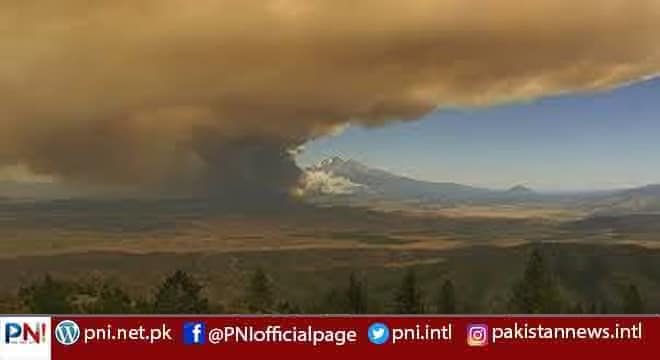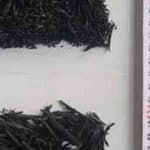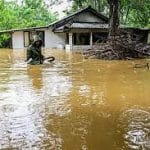ISLAMABAD, Jul 24 (APP): Sandwiched between India and China, the two emerging economies of the world, Pakistan is among top ten countries prone to climate change, losing over a billion rupees per day but with minimum gains from the Green Climate Fund facility.
Since climate change is a global phenomenon with cross boundary effects none of the countries on earth is secure from its disastrous consequences. Therefore, the international community opts for measures off and on to mitigate its impact and had approved US$ 7.2 billion Green Climate Fund for year 2020 to promote adaptation and mitigation mechanisms.
But despite climate change motivated natural disasters, Pakistan has managed to get only US$122 million through intermediary funding provided by United Nations Development Program (UNDP), Asian Development Bank (ADB) and the Food and Agriculture Organization (FAO) for three projects.
According to an official document of the Ministry of Climate Change (MoCC), the country has so far availed funding for one project from Adaptation Fund, three from GCF and completed 15 projects from Global Environment Fund (GEF). However, it has not yet accessed Climate Investment Funds (CIFs), major bilateral climate funds, or facilities except for one project from Nationally Appropriate Mitigation Actions (NAMA).
“Pakistan’s recent and new World Bank commitments had the highest 17 contributions of climate co-benefits (CCBs) that reached 44% in Fiscal Year 2021 (up from 34% in Fiscal Year 2020), and is the highest in South Asia’s World Bank portfolio and among the highest in the world,” the document reported.
The total GEF and GCF financing cumulatively is US$158.82 million that contains US$113.2 million grants. The GCF-funded projects under implementation include scaling up of Glacial Lake Outburst Flood (GLOF) Risk Reduction in Northern Pakistan through the United Nations Development Program (UNDP).
This is a five-year project intended to enhance the country’s adaptation of rapidly increasing glacial melt in one of the world’s highly glaciated region. The project cost is US$37.5 million and the GCF has provided a grant of US$36.69 million alongside a co-financing of US$0.5 million.
The Green BRT Karachi is another project assisted through GCF with US$538.5 million chipped in by the ADB which aimed at improving climate mitigation through eco-friendly transport in the biggest metropolis of Pakistan. The GCF senior loans for the project comprised of US$ 37.2 million, $11.8 million grants, co-financing (senior loans) of $442 million and grants (co-financing) of $92.5 million.
Another project “The Transformation of Indus Basin with Climate Resilient Agriculture and Water Management” is being executed with the assistance of FAO to develop the country’s capacity to use information it needs to adapt to impacts of climate change on agriculture and water management by using modern technology.
The six years duration project will be completed at a cost of $47.69 million out of which $34.99 million will be GCF grant and $12.7 million co-financing amount. The Pakistan Distributed Solar Project will be completed in 10 years at a cost of US$54 million out of which GCF provided US$ one million grant, $nine million GCF guarantee and $44 million will be co-financing in the shape of senior loans.
The GCF has also approved readiness of grant of US$ three million total financing to build capacity for Advance National Adaptation Process to be executed through the United Nations Environment Program (UNEP).
Pakistan clinched a funding of over US$25 million through GEF including US$ 4.6 million for Pakistan Snow Leopard Ecosystem Protection Program that will primarily focus on biodiversity and land degradation in the northern areas to be implemented though the UNDP.
Another project of Reversing Deforestation and Degradation in High Conservation Value Chilghoza Pine Forests that will help the country’s pine nut producing industry to shift to modern lines for enhanced and quality production. The project cost is US$3.9 million secured through GEF, being implemented through FAO. Under the project various pine nut processing plants have been installed in GB, and Balochistan districts producing pine nuts.
The initiative of transforming leather processing industry to low emissions and climate resilient development paths in Pakistan got US$ two million to ward off environmental damages and introduce recycling and safe practices to ensure termination of open dumping of carcinogenic materials into water courses.
UNIDO is implementing this project besides another US$ two million project on Integrated and Sustainable Waste Management for GHG Emissions Reduction from Municipal and Industrial Solid Waste.
The other projects include US$ 2.5 million project for combating land degradation through integrated and sustainable range and livestock management to promote resilient livelihoods in Northern Punjab; US$ 3.9 million project to combat climate change through promotion of sustainable biomass energy technologies; and US$ 2.67 million project to strengthen community-managed protected areas for conserving biodiversity and improving local livelihood.
The nationally determined contributions (NDCs) submitted by the country at the 26th Conference of Parties (COP-26) 2021 claims that Pakistan needs annually US$ 47-54 billion to adapt and mitigate the climate crisis. Pakistan will need US$40 billion per annum for mitigation while its adaptation cost ranges between US$7-14 billion per annum for climate action.
Pakistan has also pledged to shift 60% of its country’s energy mix to renewable that will alone require US$101 billion by 2030 along with an additional $65 billion by 2040. The World Bank study claims that the country will need US$13 billion to replace the coal fired power projects with solar.
Follow the PNI Facebook page for the latest news and updates.









